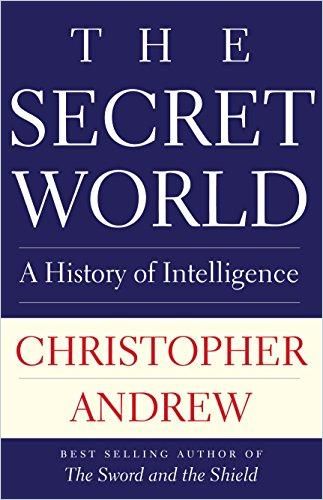Best-selling intelligence historian Christopher Andrew provides a complete, detailed history of spying, intelligence and its uses.

Intelligence Always Wins
In this sweeping, magisterial overview, Cambridge scholar Christopher Andrew – former chair of the history faculty at Cambridge University and chair of the British Intelligence Study Group – addresses the “missing dimension” in historical accounts: intelligence. From Sun Tzu’s The Art of War to the Iraq War; from the biblical Joshua to George Washington to Saddam Hussein, Andrew focuses on how intelligence operatives determine an enemy’s plans. He details the machinations behind wars, intrigues and executions, and warns that in any setting – including business – ignoring or misusing intelligence invites peril.
Intelligence
Intelligence gathering exists to gather knowledge that governments and their military can’t attain openly. Andrew’s theme is that intelligence, however little it is honored, shaped or changed world events.
Academic historians have frequently tended either to ignore intelligence altogether, or to treat it as of little importance.Christopher Andrew
With terrorism and cyber warfare threats on the rise, Andrew asserts that policy makers must understand the history of intelligence to understand its application.
Divination
Intelligence is one of the two oldest professions. Andrew cites the Old Testament book of Exodus, in which Joshua took Jericho with the help of spies, prostitutes and God.
The most famous spy, Judas Iscariot, worked for money. Other motivators are ideology, compromise and ego. Judas exemplifies how authoritarian regimes use spies to root out subversion.
The first major figure in world literature to emphasize the importance of good intelligence was God. Christopher Andrew
The Trojan Horse deception in The Odyssey remains the most famous covert action in warfare. Greek and Roman leaders relied more on divination than on human intelligence (”HUMINT”). They employed seers, consulted oracles and heeded omens. Julius Caesar, Andrew explains, was among the first to communicate in code.
Signals Intelligence
Intelligence disappeared for almost 1,000 years in Europe after the fall of the Roman Empire. It flourished on the Arab Peninsula in the time of Muhammad, who used it extensively. For much of the Middle Ages, the Catholic Church gathered and used intelligence to punish religious subversives.
The greatest innovation in 16th-century European intelligence collection was the role of SIGINT – a field in which it retained for several centuries a major lead over other continents. Christopher Andrew
The European Renaissance, Andrew notes, marks the dawn of modern intelligence. Venice’s secretive Council of Ten set up the first code breaking agency, SIGINT, for intercepting and decrypting “signals intelligence” – communications.
Cardinal Richelieu employed SIGINT in 17th-century France and George Washington exploited it during the American Revolution. Russia’s SIGINT has operated almost without interruption since the 16th century.
With major technological advances in communications and almost continuous war – hot and cold – SIGINT use exploded in the 20th century. Though it has been crucial to policy and diplomacy for more than 500 years, Andrew laments that few history texts include it.
Oppressive Regimes
One of the author’s most crucial recurring points is that intelligence failure almost always stems from poor analysis, not poor collection. Nations with rigid ideological stances misinterpret intelligence because they won’t accept what doesn’t fit their worldview. Politicizing intelligence degrades it; Andrew insists that democracies must respect intelligence.
Paranoia was an essential constituent of the collection and assessment of what passed for intelligence during the Terror. Christopher Andrew
Authoritarian regimes, such as the Spanish Inquisition, for example, politicize intelligence to ferret out perceived subversion. French Revolution leader Robespierre, obsessed with counter-subversion, killed so many of his compatriots that survivors guillotined him to save themselves. Stalin ignored intelligence warning about a Nazi invasion to root out “Trotskyites” – supposed but nonexistent loyalists to his rival.
Cold War
In 1997, the CIA recognized Benjamin Franklin as the “Founding Father of American Intelligence” for the ingenious schemes he enacted as envoy to France in 1776. However, the United States did not create its first SIGINT agency until World War I. Britain, the United States and Russia refined their intelligence for World War II, when British analysts broke Hitler’s Luftwaffe Enigma code – one of the great intelligence coups of all time. The USSR showed extraordinary skill in penetrating its allies’ secrets, once Stalin shifted from pursuing imaginary enemies. The United States, Andrew tells, suffered an ignominious intelligence blunder – the Japanese attack on Pearl Harbor.
Intelligence operations served, in different ways, both to stabilize and to destabilize the Cold War.Christopher Andrew
The Cold War depended on stealth, deception and interception. The United States never spied on the USSR as successfully as the USSR spied on the United States. No one has learned whether intelligence operations prevented a “hot war” or, as Andrew suggests, if they prolonged the KGB’s social control of a one-party state beyond its natural life span.
History
The CIA’s failure to predict the 1979 Iranian Revolution exemplifies a wide-reaching failure to identify the reach of religious extremism – exemplified by the September 11, 2001, terrorist attacks on New York City and the Pentagon, and the second Iraq War. American leaders’ justification of that war rested on false intelligence concerning weapons of mass destruction. Andrew insists that the United States could have thwarted the September 11 attacks if Western intelligence had examined the history of religious terror.
Common to the intelligence failures of both 9/11 and the Iraq War was serious neglect of past experience.Christopher Andrew
Using intelligence to reinforce misconceptions about the outside world is a problem common to authoritarian regimes. For example, contemporary China uses intelligence to suppress internal dissent.
Massive Tome
This 940-page definitive work on its subject proves absurdly readable and compelling. Andrew writes with great flair and flow – that is, he writes like a novelist, dispensing indispensable history you never heard before and drawing cynical, accurate, lesson-giving conclusions. That he writes as ably about Ancient Greece and American blunders over Iraq only proves the depth of his research and passion. As Andrew details how intelligence clandestinely shaped world history, he unveils secret, interlocking actions that will change your view of how governments, laws and history function.
Co-editor of the Intelligence and National Security Journal, Christopher Andrew also wrote the bestseller The Defense of the Realm.









